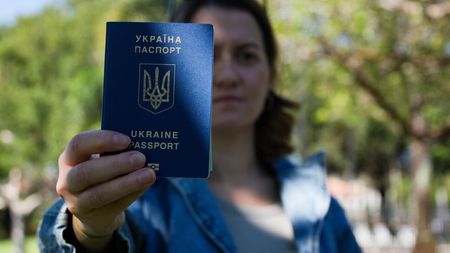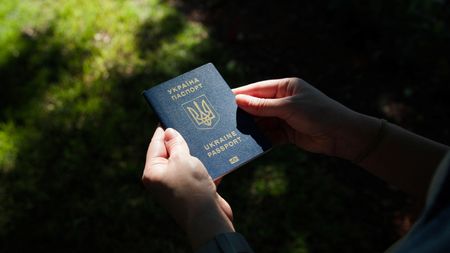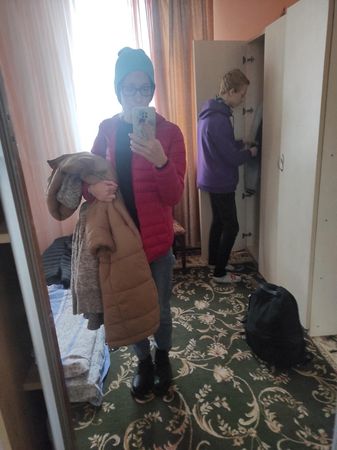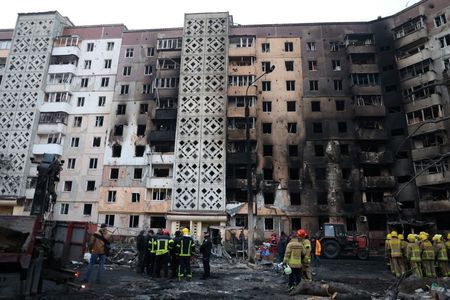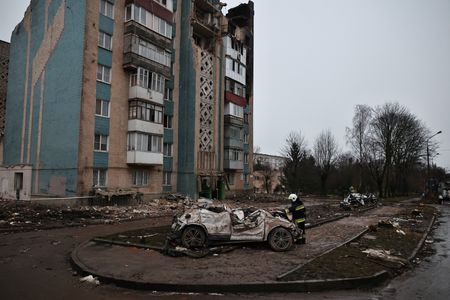By Ted Hesson, Kristina Cooke and Disha Raychaudhuri
WASHINGTON (Reuters) -Kateryna Golizdra has survived six months in legal limbo – so far. She thinks she can hold out another six months, waiting for Donald Trump’s administration to decide the fate of a humanitarian program that allowed some 260,000 people who fled the war in Ukraine to live and work in the United States.
When her legal status lapsed in May, Golizdra, 35, automatically became vulnerable to deportation. She lost her work permit and was forced to leave a job earning over $50,000 a year as a manager at the Ritz-Carlton in Fort Lauderdale. Golizdra also lost the health insurance that she used to cover check-ups for a liver condition. And she can no longer send money to her mother, who was also displaced and lives in Germany, she said.
The Trump administration’s processing delays on the humanitarian program for Ukrainians launched by former Democratic President Joe Biden left nearly 200,000 people at risk of losing their legal status as of March 31, according to internal U.S. government data reviewed by Reuters. The number of Ukrainians affected by the delays has not been previously reported.
The humanitarian program, introduced in April 2022, allowed nearly 260,000 Ukrainians into the U.S. for an initial two-year period. That’s a small share of the 5.9 million Ukrainian refugees worldwide, 5.3 million of whom are in Europe, according to United Nations refugee figures.
Golizdra said she has no idea when – or if – her permission to stay in the United States might be renewed, threatening her short-lived sense of security in America.
While she waits for an update on her application, she could potentially be arrested by federal immigration authorities, three former immigration officials said.
‘CONSTANT STRESS’
The last six months have felt like she is on a “hamster wheel,” Golizdra said.
“It’s a constant stress, anxiety,” she said. “If I will need to leave the States, then I will have to build something again.”
Reuters spoke with two dozen Ukrainians who lost their work permits – and their jobs – due to delays in processing renewals, including tech workers, a preschool teacher, a financial planner, an interior designer and a college student. They described digging into their savings, seeking out community support and taking on debt to support themselves while they wait for a decision on their status.
Some of the people interviewed by Reuters said they were worried they could be arrested by U.S. immigration authorities. Others said they were staying indoors, or had left the U.S. for Canada, Europe and South America.
Returning to Ukraine is not an option. Golizdra’s home in Bucha, a Kyiv suburb, was set ablaze in March 2022 when Russian troops stormed the city. After Ukrainian forces retook the town, they found hundreds of bodies, including of civilians who were victims of extrajudicial killings.
TRUMP’S SHIFTING UKRAINE POLICY
The Trump administration paused processing applications and renewals of the Ukrainian humanitarian program in January, citing security reasons.
After a contentious Oval Office meeting with Ukrainian President Volodymyr Zelenskiy, Trump said in March that he was weighing whether to revoke the Ukrainians’ legal status entirely – a plan first reported by Reuters.
Trump ultimately did not end the program and in May, a federal judge ordered officials to resume processing renewals.
But U.S. immigration officials have processed only 1,900 renewal applications for Ukrainians and other nationalities since then, a fraction of those with expiring status, according to U.S. government data released last week as part of a lawsuit.
Meanwhile, a spending package Trump signed into law in July added a $1,000 fee to such humanitarian applications – on top of a fee of $1,325 per individual.
The White House referred questions about the Ukrainian humanitarian program to the U.S. Department of Homeland Security, which did not respond to requests for comment.
U.S. Representative Mike Quigley, a Democrat in the Chicago area, said his office has received requests for assistance from more than 200 Ukrainians in limbo.
“There’s a fear that if they haven’t completed their application, if they haven’t gone through the whole process, they’re vulnerable for deportation,” Quigley said.
Anne Smith, the executive director and regulatory counsel of the Ukraine Immigration Task Force, a legal coalition formed to aid those who fled the war to the U.S., said her attorney network was receiving multiple calls per week from Ukrainians saying they have family members detained by immigration authorities. She said Ukrainians have been arrested at construction sites, while doing food delivery or working as Uber or truck drivers, as well as in broader sweeps in Chicago and greater Cleveland.
Brian Snyder, a product marketing manager in Raleigh, North Carolina , who has sponsored three Ukrainian families , said people who followed the rules are being treated unfairly.
One Ukrainian woman recently asked if he would serve as her emergency contact if she was picked up by immigration officers, he said. He knew of another family where a teenage son’s parole was renewed while the parents and two younger children were left waiting, he said.
“All of this dysfunction and uncertainty is just introducing a tremendous amount of stress in these families’ lives,” he said.
SOME UKRAINIANS ‘SELF DEPORT’
Six of 24 Ukrainians interviewed by Reuters have left the U.S. rather than risk ending up in immigration jail or being sent to Latin America or Africa, as the Trump administration has done with other hard-to-deport immigrants.
Yevhenii Padafa, a 31-year-old software engineer who moved to Brooklyn in September 2023, applied to renew his status in March. His application sat pending until it expired in September.
Worried that he could be barred from the U.S. in the future if he remained without legal status, he tried to “self deport” using a government app known as CBP One.
The Trump administration in May promised a free outbound plane ticket and $1,000 “exit bonus” for those using the app.
Padafa decided to go to Argentina, which has a lower cost of living than other countries and offers a humanitarian program for Ukrainians. But the app would not book him a ticket there. A U.S. border official told him the flight would need to be booked to Ukraine, he said.
He was counting on the free flight and $1,000 bonus. Arriving in Buenos Aires in mid-November with little money, he planned to sell a laptop to cover initial rent for an apartment.
“If I return to Ukraine, I’ll just go to the frontline,” he said. “I’d rather be homeless somewhere than go to Ukraine.”
(Reporting by Ted Hesson and Disha Raychaudhuri in Washington, Kristina Cooke in San Francisco; Additional reporting by Maria Alejandra Cardona in Margate, Florida; Editing by Craig Timberg and Suzanne Goldenberg)

